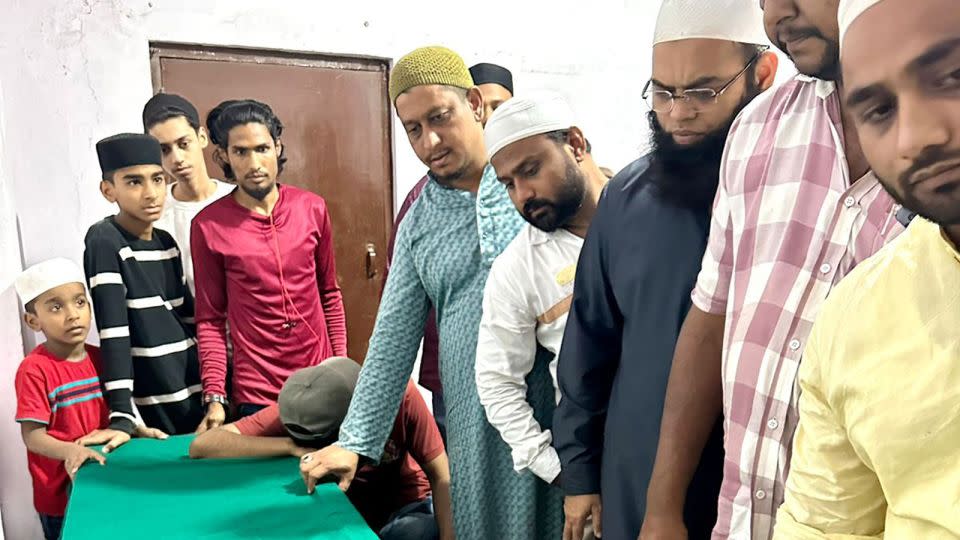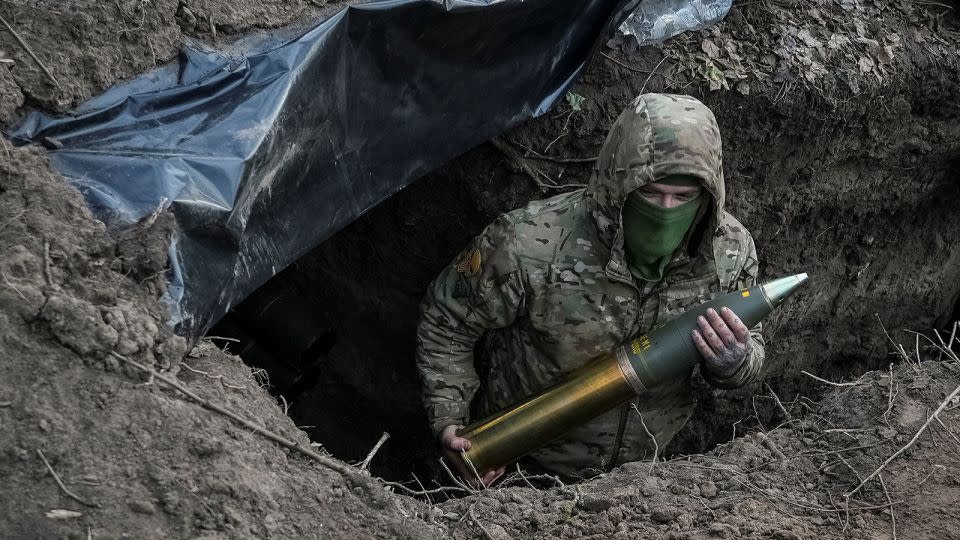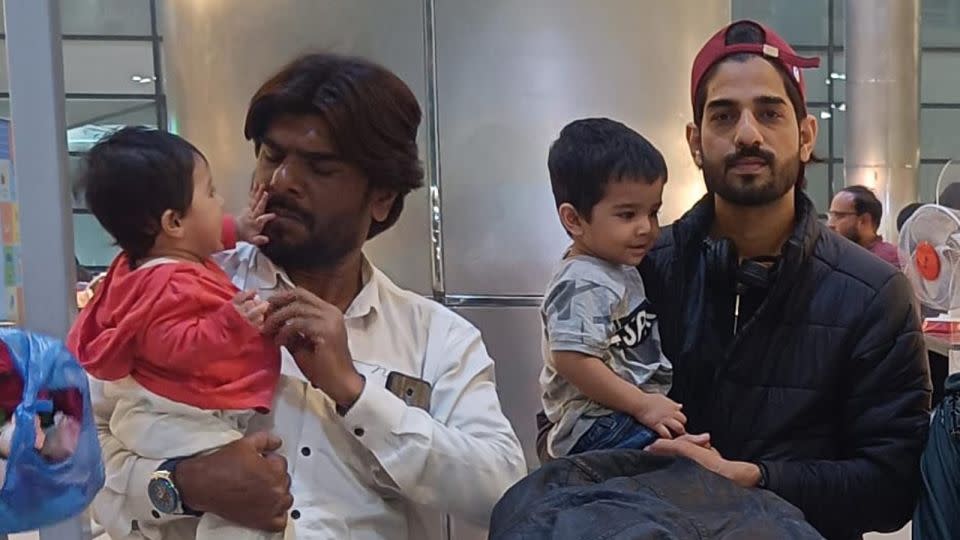How an Indian store manager ended up killed on the battlefields of Ukraine fighting for Russia

They opened the box on a Sunday in late March, discovering Asfan Mohammed for the first time since he left India for Russia four months earlier.
He was better dressed than when he left – a black suit, white shirt, tie and shoes replacing the casual outfit he wore when his family and friends accompanied him.
But he had to be buried in accordance with his Muslim beliefs, so his body had to be prepared; neat clothes removed.
It was then that Imran Mohammad, 41, realized the extent of what had happened to his 31-year-old brother while he was fighting for the Russian armed forces in Vladimir Poutinethe invasion of Ukraine.
“I saw holes in the back of his shoulder, in his ribs all the way down to his lower back,” Imran told CNN.
“There were six to seven holes caused by a drone attack. It pierced his body. There was internal damage. Two teeth were broken.
And now this close-knit family from Hyderabad in southern India was also broken. A husband, a father and a breadwinner gone.
Imran’s business was also in ruins, rotten by neglect while he had focused all his energies on finding out what had happened to his brother on the battlefield of Europe’s bloodiest conflict since the Second World War. worldwide.
Imran noted the time.
“I opened the box at 11 a.m. on Sunday. When I first saw his body, I was struck by the fact that he was no more,” he said.
“My efforts to find my brother, my two-month fight for my brother, came to a painful end. I wanted to react by looking at his corpse, but I couldn’t. I became totally numb.
A lost dream
Asfan met an unlikely fate – one his family could never have imagined when Putin ordered Russian troops into Ukraine in February 2022.
At the time, the father of two was running a clothing store, one of local chain Allen Solly’s nearly 300 stores in India, selling children’s clothes, wedding tuxedos and just about everything else .
He had been there for eight years, his brother said.
It wasn’t the worst job, but Asfan wanted more for his wife and two children, ages 2 and 8 months. And he dreamed of getting them out of Hyderabad.
“He wanted to work in Australia,” where his sister-in-law and her family lived, Imran said. “They were calling him and his family there.”
But that meant Asfan would need a high score on the International English Language Testing System (IELTS), which assesses the skills of non-native speakers.
“He passed his IELTS. He didn’t do well,” Imran said. “He felt unmotivated. He tried again.
It didn’t work, Imran said.

But YouTube videos about job opportunities in Russia gave Asfan hope, and he contacted an employment agency, his brother said.
“He was going to work as a taxi driver or delivery man in Russia – that process was ongoing,” Imran said.
“Then a few days later, the agents announced that there were vacancies for assistant and security positions in the Russian army. The agents assured him it was the best job. They said he could get a Russian passport and a national card within a year that would allow him to travel to neighboring countries.
Asfan thought it could be a stepping stone to his family’s dream life in Australia, his brother said.
Instead, his choice took him to the frigid, battle-scarred landscape of Ukraine.
Brainwashing
Asfan kept his plans secret from family and friends until it was too late to back out, according to Imran, who said he only learned his brother was leaving three days before he left for Russia , on November 9 last year.
By then, Asfan had paid more than $1,800 to recruiters, who asked him not to tell anyone, even his family, about his plans to travel.
“They had brainwashed him so much… They warned him that he could be deported from Russia, from the airport,” Imran said. “I tried my best to stop him.”
After a multi-stop itinerary that took him through other Indian cities and the United Arab Emirates, Asfan arrived in Moscow on November 12.
A day later, he signed papers – in Russian, which he could not read – committing him to work, his brother said.
“He trusted the agents a little too much,” Imran said.


Foreign fighters in Putin’s war
By some estimates, Russia has sent thousands of foreign men to fight in Ukraine since Putin ordered the invasion.
Many of them are young men from South Asia, attracted by the prospect of stable employment and higher salaries in Russia. In Nepal, prominent opposition MP and former foreign minister Bimala Rai Paudyal told parliament earlier this year that between 14,000 and 15,000 Nepalis were fighting on the front lines, citing the testimony of men returning from Ukraine.
The Russian government last year announced a lucrative program for foreign fighters to join the country’s military, including a monthly salary of at least $2,000 and a fast track to Russian citizenship – but the Kremlin did not did not specify how many foreigners he had recruited as part of this plan.
New Delhi has maintained close ties with Moscow since the Cold War and has largely avoided outright condemnation of the invasion by Russia, which remains India’s largest arms supplier.
India has also become a major buyer of Russian energy, bolstering Moscow’s coffers with record purchases of $37 billion in crude oil last year alone and providing vital revenue for Russian sanctions battering the economy .
Meanwhile, India, which has no law prohibiting its citizens from serving in the military of a foreign state, has acknowledged that a number of its nationals fought for Russia in Ukraine.
In a statement released in February, India’s foreign ministry said the rapid release of these Indians from the Russian army was a “top priority.” The ministry told CNN last month that it was in constant contact with Russian authorities to achieve this.
But for some, these efforts would come too late. A ministry spokesperson told CNN that at least two Indians had died in the conflict.
In early March, India’s Central Bureau of Investigation (CBI) said it had dismantled major human trafficking rings that lured men into Russian military jobs, with 35 such cases identified.
“The trafficked Indian nationals were trained for combat roles and deployed to front bases in the Russian-Ukrainian war zone against their will,” the CBI statement said.
Towards the front line
Asfan did not tell his brother when he was going to be sent to Ukraine, Imran said, but he made contact on December 1, as he was heading to the battlefield.
Asfan was looking for a way out, Imran said.
“He asked me to speak to the officers,” Imran said. “I promised him I would do my best.”
It was the last time they spoke.
“Military personnel were not in contact with these agents,” Imran said.
“These brokers deceived the boys and put their lives in danger,” he said, referring to Asfan and other Indians sent to war.
Weeks of uncertainty, then disbelief
On January 23, Imran received a voicemail from one of the Indian men deployed alongside Asfan.
The man, who said he had been injured in combat, told Imran that he had found Asfan, who had also been injured, in a house in Ukraine the day before.
Imran said the man told him he couldn’t pick up his brother “because of the drones around them” but reported Asfan’s condition to a Russian medical team.
Ukrainian forces have used repurposed commercial drones against their Russian adversaries, to devastating effect on the front lines, either dropping grenades from above or using them as remote-controlled bombs.
Two days later, Imran said he visited his MP to try to get Indian authorities to help his injured brother. But calls to the government went unanswered, he said.
The Indian embassy in Moscow finally responded that it was looking into the matter.
During a March 6 visit to his MP’s office, Imran received the news he had been dreading.


“We called the emergency number of the Indian embassy (in Moscow). As soon as I mentioned Asfan’s name on the phone, they told me he was dead. I didn’t have the strength to talk to them,” he said.
“I didn’t want to believe what they were saying.”
He still had no visual proof of Asfan’s death, but he had to pass on what he learned to the rest of the family.
Asfan’s wife “was unconscious for three hours,” Imran said. “She cried all night.”
Asfan’s family buried his body, but it is scarred by a distant war.
Imran says it hurts him to see his brother’s young children, who will never know their father. And he says his own future seems uncertain.
“This has been going on for four months, 24 hours a day,” he said. “This has been the worst phase I have ever gone through. There is no more personal life. There are no more friendships left. I only take care of my family.
And one of them, his brother, is gone forever.
For more CNN news and newsletters, create an account at CNN.com
yahoo


